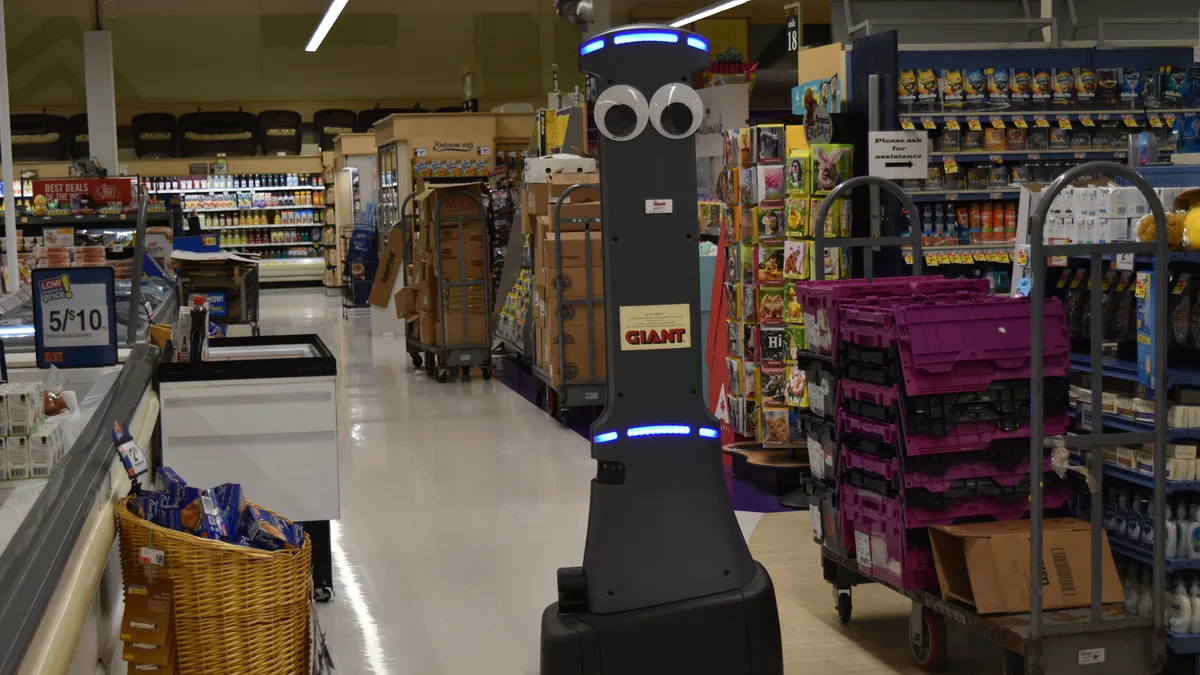Dive Brief:
- Ahold Delhaize said it will bring shelf-scanning robots to nearly 500 of its Giant/Martin's and Stop & Shop locations after a successful test at two Giant stores during the last year. The in-store robots, which are named "Marty," will be in all 172 Giant stores.
- The Netherlands-based grocery giant said it has started rolling out the robots at Giant/Martin's and Stop & Shop, a deployment that will continue through the early part of 2019. Other Ahold Delhaize USA brands will continue to test autonomous robots in select stores.
- "Several companies in the grocery retail space have recently begun testing or using in-store robots — something Retail Business Services and the local brands we serve have been doing for some time," Paul Scorza, executive vice president and chief information officer for the Retail Business Services division of Ahold Delhaize, said in a statement. “We’re pleased to support the Giant/Martin's and Stop & Shop brands as they now lead the industry from test to large-scale usage of robots and to see the benefits the technology continues to drive for their businesses.”
Dive Insight:
The widespread deployment of robots by Ahold Delhaize across roughly a quarter of its total U.S. stores is the biggest endorsement yet of a technology that until now has been largely in the test phase across the grocery industry. The fact that Ahold Delhaize is ramping that up to about 500 stores — rather than gradually increasing its footprint — shows the company is pleased with the early test results so far.
Similar initiatives are underway at other U.S. grocery stores. Schnuck Markets, a St. Louis-based grocery chain, announced last October that it will put Tally, the aisle-scanning robot developed by San Francisco-based tech firm Simbe Robotics, in 15 stores. The decision follows a successful six-week test of Tally in three St. Louis locations. And Walmart began piloting robots made by Bossa Nova Robotics in 50 locations in 2017 and plans to put 360 autonomous floor-scrubbing bots in stores early this year.
Ahold Delhaize and Schnucks are careful to point out that adding robots to the mix will not displace human workers. The robots have been used to perform tasks such as looking for out-of-stock items on shelves and scanning the floor for potential hazards. These areas can be prone to human error and lack of oversight, so automating the process could provide a safer, more enjoyable environment for shoppers.
As grocers look to stand out and compete amid growing pressure from e-commerce players like Amazon and discounters like Lidl and Aldi, the robots enable grocers to shift workers to other areas of the store to address customer needs. Walking the aisles looking for out-of-stock items can take up to four hours at some stores. Moreover, when products are missing on shelves, it can make shoppers not want to return. This is particularly disruptive when grocers are depending on customer service and an array of unique products to attract shoppers to their stores.
In announcing its expanded rollout, Ahold Delhaize noted that other retailers have announced similar use of in-store robots. In being one of the first grocery companies to test out and now expand the use of robots on a larger scale, Ahold Delhaize indicates the hefty upfront costs associated with the technology are worth the long-term savings.
But the use of robots in the store requires much more than deploying devices. Retailers need to gauge how customers will react, iron out technological glitches that may arise, and determine what to do with the data robots collect. Ahold Delhaize likely had an early advantage in addressing these issues. As these solutions become more solidified and more retailers embrace robots as part of their push to automate processes and cut costs, robots could soon become a common sight at U.S. supermarkets.













